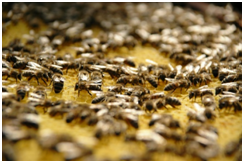22
Nov
UK Beekeepers End Sponsorship Deal with Pesticide Industry
(Beyond Pesticides, November 22, 2010) The British Beekeepers’ Association (BBKA) last week announced plans to end its controversial practice of endorsing pesticides for financial benefit from leading chemical manufacturers. The endorsement of four products as “bee-friendly” caused outrage among many beekeepers because one of the companies, Bayer Crop Science, makes pesticides like imidacloprid, an insecticide widely implicated in the deaths of honeybees worldwide.
The 135-year-old charity endorsed pesticides used to combat the varroa mite that is linked to the collapse of colonies as “bee-friendly.” In return, for the past 12 years the association has received £17,500 ($27,949) a year from Bayer Crop Sciences and Syngenta. This relationship angered many members and some left the association. However, the BBKA denies that it has bowed to pressure from members who have been increasingly critical of its relationship with Bayer and other chemical companies.
In a statement sent out this week to the secretaries of local beekeeping associations across the UK, the BBKA’s president, Martin Smith, said: “Following discussion with the companies involved, the BBKA trustees have decided that endorsement and related product-specific payments will cease as soon as practically possible.” He added: “The four products subject to BBKA endorsement are of declining commercial importance and the development of new classes of pesticides and application techniques means that the relationship with the plant-protection industry should be reviewed.”
Beekeeper Graham White, who resigned from the BBKA more than two years ago in protest at what he called a “secret deal done with the pesticide manufacturers whose products are lethal to bees,” welcomed today’s decision.
“It’s great news, but it’s too little, too late,” he said. “They should have been showing solidarity with beekeepers in France, Germany, Italy and Slovenia when pesticides were banned there after being implicated in bee deaths, instead of selling their logo to the manufacturers.” In 2008, Italy joined Germany, Slovenia and France in banning the pesticides linked to bee die-offs.
Mr. White says all ties to the pesticide industry should be immediately severed. “All of those who created and directed this policy of pesticide endorsement must be thrown out of the BBKA and replaced by real beekeepers. The BBKA is not fit for purpose and will never recover its moral integrity until it is reconstituted as a pure beekeeping organization that is willing to campaign against all use of systemic pesticides on British farms.”
Meanwhile, new research from the European Beekeeping Coordination and Corporate Europe Observatory published a report also released last week which states that industry “experts” are undermining EU review of the regulations of pesticides and putting Europe’s bee population further at risk. Further, a number of “experts” from pesticide companies were found to be involved in defining which tests are required to verify the safety of new pesticides under the EU pesticides directive. This report comes ahead of a vote by members of the European Parliament later this month on a resolution requiring independent research into bee mortality and a revision of EU rules governing risk assessments of bees’ exposure to pesticides.
The BBKA’s position has polarized the 45,000-strong beekeeping community, but the majority of BBKA members upheld its policy at its annual delegate meeting earlier this year and in 2009. At the next meeting in January, delegates will be asked to note this week’s decision “with respect to the cessation of BBKA endorsement of certain pesticides.”
The products implicated in bee deaths, clothianidin, imidacloprid, fipronil, and thiamethoxam, are approved to kill insects on a wide range of crops in the UK including very widely grown oilseed rape (canola), barley, and sugar beet. Bayer’s imidacloprid and clothianidin are implicated as causing the bee deaths. Since their introduction by Bayer CropScience in the U.S. in 2003, these neonicotinoid pesticides have been linked to the devastating loss of millions of honey bees in a number of countries. Germany banned the pesticides after beekeepers reported that two thirds of their bees died in May 2008 following the application of clothianidin.
These extensive bee deaths are known also as Colony Collapse Disorder (CCD). For the past several years, beekeepers in the U.S. have reported unexplained losses of 30-90% of the bees in their hives. According to the U.S. Department of Agriculture (USDA), bees pollinate $15 billion worth of crops grown. USDA also claims that one out of every three mouthfuls of food in the typical American diet has a connection to bee pollination. As the bee deaths worsen, Americans will see their food costs increase. Congressional hearings on the phenomenon found that USDA was unable to account for the $20 million that Congress has allocated to the department for fighting CCD in the last two years. Recently, research found that a combination of a virus and a fungus may be responsible for bee deaths. Most other research work has hypothesized that there are numerous factors, including pesticides, that depress the immune and nervous system of bees, creating a vulnerability to other factor, however research is still not conclusive and researchers continue to search for a cause and a cure.
First reported in 2006, CCD is unlike other ailments that have affected honeybees in the past because worker bees simply disappear rapidly, never returning to the hive where the queen still lives with a small cluster of bees amidst pollen and honey stores in the presence of immature bees (brood). It has been reported that losses of honeybee colonies across 21 states in the winter of 2007-8 averaged 35%, with a high degree of variability. For more information, read Beyond Pesticides’ Pollinators and Pesticides.
Source: The Guardian UK










